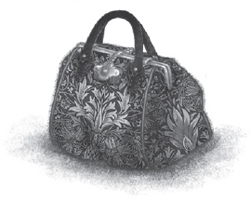

“Goodness, Ivy, I do hope it goes well.”
I peeked through the curtain and looked out. People were streaming in. Taking their seats. Talking eagerly. “It will be a raging success, Ma. We’re practically sold out, after all.”
“Ten minutes until curtain up!” cried Bertha, hurrying past. “Jago, where is the sheet music?”
“I just gave it to Mr. Spencer,” said the boy. While his voice had gotten deeper, his grin was as mischievous as ever. “Unless you or Mrs. Dickens want to play the piano?”
“Not me, lad,” said Mrs. Dickens, rushing from the dressing room. She had a needle and thread in her hand and a dress flung over her shoulder. “Two girls with uneven hems—I’m run off my feet, I am!”
Two years had rushed by in a wondrous blur. After a few months in Dorset, we had settled into the apartment in Berkeley Square; me and Ma, Mrs. Dickens and Bertha, and of course Jago. We were a family in every way that mattered. With some of the money from Mr. Banks, Ma had opened a music school in Hampstead—Pocket’s Melodies. Ma taught piano and singing to girls and boys from all over London.
“The children are rather nervous about singing in front of their families.” Ma had her hands clutched together like she did when she was fretful. “Oh, Ivy, it’s our first big concert. Do you think we are ready? Perhaps we haven’t rehearsed enough or spent enough time—”
“Your students are ready, and so are you,” I said, gripping her arm. “Everybody knows their part, they will sing their hearts out, and the whole concert will be a smashing success.”
Ma was like that at times. Fretful. Anxious. Usually she was strong and sure—but not always. Some nights her dreams were bad. She would cry out. About Lashwood. And my father. And the years we had lost. But I always told her that what we have now is so stupendous because it took two worlds, one necklace, and a great deal of calamity and good fortune to get us here.
Some others hadn’t been as lucky. A few months after the ball at Butterfield Park, Mr. Partridge got word that Estelle Dumbleby’s family fortune was gone—stolen by an underhanded banker who spent every pound Estelle had to pay for his gambling habit. The grand house in Highgate had been sold, and Estelle was last seen at a dress shop in Mayfair, begging for employment. Which was glorious!
Countess Carbunkle had fared even worse. After her humiliation at the Butterfield Park anniversary ball, Miss Anonymous wrote a wondrously snarky story under the headline COUNTESS CATASTROPHE STRIKES AGAIN! The story was printed in newspapers far and wide. Utterly humiliated and a worldwide laughing stock, Countess Carbunkle had purchased a lighthouse off the coast of Alaska, vowing never to show her face in public again. So good news all around then!
“Are you as musical as your mother?” said Mr. Spencer, combing his unruly hair.
Mr. Spencer was not our usual piano player, but as Mrs. Harding was out with the flu, he had stepped in. “Can you sing?” he asked me, slipping the comb into his coat pocket.
“No, dear—I sound like three cats in a meat grinder. Though I did once burp ‘God Save the Queen.’”
Mr. Spencer let out a wistful sigh. “I do love Queen Victoria, such dignity. It can’t be easy, can it, being a queen?”
“Actually, it’s really not that difficult,” I said brightly. “I admit, I was only Queen Ivy for about five minutes, but still—”
“Ivy.” Ma was shaking her head.
“Queen Ivy, you say?” said Mr. Spencer, bug-eyed.
I groaned cheerfully. “Forgive me, Mr. Spencer. I talk a great deal of nonsense, being an odd sort of girl with an intriguing past.”
All talk of Prospa was forbidden outside the house. On account of people thinking we were bonkers and locking us up. Ma had had her fill of madhouses. As had I.
“Girls and their tall tales,” muttered Mr. Spencer as he set off for the piano.
Ma laughed and kissed my cheek. “Wish me luck.”
I did. And she kissed me again. Then she began rounding up her students, putting them in position on the tiered platform. The concert hall was nearly full. I saw Mr. Partridge sitting up front—dressed in a fine white suit, his top hat in his lap. Mr. Partridge had taken quite a shine to my mother, though she was usually too shy and quiet to give him much encouragement. Ma had that way about her, though. You just wanted to be near her.
“Remember, children,” said Ma, taking her position in front of the choir, “big voices, big smiles!”
She signaled to Jago. The boy pulled on the cord, the curtain parting. As it flew open, I looked out into the crowd again, delighting in their faces as they began to clap and cheer. Which is when I saw her. She was standing at the back. Dark dress. Flaming red hair. It was Miss Frost, stern and dignified. She looked at me, gave a slight nod of her head. I was too stunned to nod back. A man rushed in front of her to take his seat. When he had passed, Miss Frost was gone. My eyes roamed the hall, looking for any sign of her. Had it really been Miss Frost? Wasn’t the door between our worlds shut forever?
Ma swooshed her arms through the air, and the choir began to sing. It sounded heavenly. I didn’t keep searching for Miss Frost in the crowd. I had seen her, and she had seen me—that was enough. Was it her? How could it be? The whole thing was frightfully unlikely, yet I refused to fret or wonder too deeply about it. For if my life had been a school, it would have but one lesson. Anything was possible.

